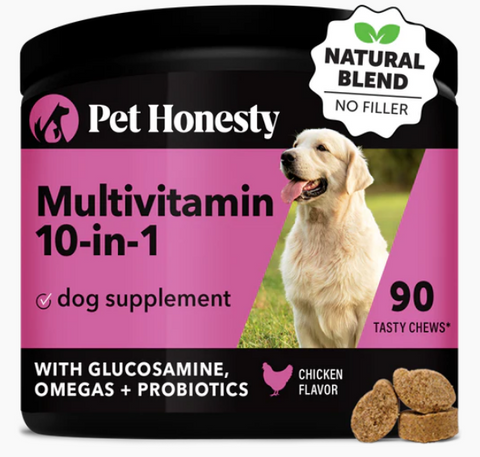The well-being of our furry, four-legged friends is a top priority, and when they're feeling under the weather, it can be just as concerning as when we or a loved one are not well. Allergies in dogs have surged, affecting up to 10% of the canine population. It's a common misfortune that often goes undiagnosed, leading to prolonged discomfort and sometimes irreversible health issues.
Understanding the signs, the testing process and subsequent management of pet allergies is essential for all pet owners. This guide will walk you through the key steps in allergy detection and management, ensuring your dog enjoys life as free from allergic discomfort as possible.
Signs Your Dog Might Have Allergies
It's important to be vigilant and notice shifts in your dog's behavior that may indicate an allergic reaction. Recognizing these symptoms early and connecting them to potential allergic triggers can help to alleviate your dog's discomfort.
When these signs appear, it's crucial to consider the possibility of allergies and take the necessary steps to confirm and address them promptly. Here's what to look out for:
Itchy Skin
If your furry friend is allergic to certain things, they might feel super itchy and scratch a lot. This can make their skin irritated, cause them to lose hair, and even get infections. Keep an eye on how much your dog licks or chews their paws – it could mean they're uncomfortable.
Want to help your pup feel better without harming the planet? Give our Allergy Skin Health chews a try!
These chews are formulated with natural ingredients such as omegas, probiotics, and vitamin C to help soothe skin-related issues associated with allergies.
Alternatively, why not pick up our Anti Itch Bundle and create a sustainable regimen? Designed as an indispensable, well-rounded sidekick for pesky allergies- this kit includes our Multivitamin 10-in-1, Allergy Anti-Itch Salmon Oil, and Probiotics Gut + Immune Health.
Digestive Issues
Diarrhea, vomiting, and flatulence can all be indicators of allergies in dogs. If these digestive symptoms are accompanied by other signs like itching or skin irritation, it's important to consider the possibility of food allergies.
Respiratory Distress
Just like humans, dogs can suffer from respiratory allergies that cause sneezing, coughing, and difficulty breathing. These reactions can be triggered by various environmental factors such as pollen, dust mites, or mold.
Ear Infections
Dogs with allergies are more prone to developing ear infections, which can cause discomfort and pain. Keep an eye out for redness, discharge, or an unpleasant odor coming from your dog's ears.
Watery Eyes and Runny Nose
Similar to humans, dogs with allergies may also experience watery eyes and a runny nose as a result of environmental triggers. If you notice your dog constantly rubbing their face or pawing at their eyes, it could be a sign of allergies.
Behavioral Changes
Allergies can also cause changes in behavior, such as increased restlessness, irritability, and even aggression. These behavioral shifts are often a result of the discomfort and frustration caused by allergic reactions.

Paw Chewing and Redness
Dogs with allergies may engage in excessive licking or chewing on their paws to alleviate discomfort or itching. This can cause redness and inflammation in their paw pads, which should be monitored closely.
Recurring Skin Infections
Allergies weaken the skin's natural barrier, making dogs more susceptible to skin infections. If your dog is constantly battling recurring skin infections, it could be a sign of underlying allergies that need to be addressed.
Top Allergy Causes in Dogs
The next crucial step in managing your dog's allergies is identifying the specific triggers that are causing their reactions. There are three main categories of allergies in dogs: environmental, food, and contact allergies.
Environmental Allergies
Environmental allergies, also known as atopic dermatitis or canine atopy, are the most common form of allergies in dogs. These occur when a dog is exposed to substances such as pollen, dust mites, or mold and develops an immune response that causes allergic symptoms.
Food Allergies
Food allergies occur when a dog's immune system reacts negatively to a particular ingredient in their diet. Common food allergens for dogs include beef, chicken, dairy products, wheat, and soy. A food allergy can cause a wide range of symptoms, including skin irritation, digestive upset, and even ear infections.
Contact Allergies
Contact allergies happen when a dog's skin comes into direct contact with an irritant, such as certain types of grass or cleaning products. These allergies typically result in localized reactions, such as itching and redness.
Contact allergies can also occur from coming into contact with pests such as fleas, or ticks. Flea allergy dermatitis is a common environmental allergy that occurs when a dog has an allergic reaction to flea saliva. This can cause intense itching and skin irritation, leading to secondary infections.
The Allergy Testing Process
If you suspect your dog may have allergies, it's important to consult with a veterinarian who can perform the necessary tests to confirm the diagnosis. There are two main types of allergy testing for dogs:
Skin Prick Test
Similar to human allergy testing, this method involves injecting small amounts of common allergens into the skin and monitoring for a reaction. This test is typically done under sedation and can help identify environmental, food, and insect allergies.
Blood Test
A blood test, also known as an ELISA or RAST test, measures the levels of antibodies in your dog's blood to various allergens. This method can be used to detect both environmental and food allergies but may not always provide accurate results.

Which Allergy Test is Better?
Both tests have their own sets of advantages and limitations. The skin prick test is more immediate and can be performed on younger dogs. However, it may require sedation, and the results can sometimes be affected by medications or skin conditions.
On the other hand, blood tests are less invasive, but they might yield false positives and cannot test for food allergies like skin prick tests can. Consider the cost, your dog's age, and health status, and consult with your veterinarian to decide which test is best for your furry companion.
Preparing for Allergy Testing
Before your dog undergoes allergy testing, there are some preparations you can make to ensure accurate results:
- No antihistamines: If your dog is on antihistamine medication, it's important to stop giving them at least a week before the test. These medications can interfere with the test results and may need to be stopped for a longer period if prescribed by your veterinarian.
- No steroids: Steroid medications, such as prednisone, can also affect the test results and should be stopped at least three weeks before testing.
- No skin infections: If your dog has any active skin infections or wounds, it's best to postpone allergy testing until they have fully healed. These issues can interfere with the reactions on the skin prick test, leading to incorrect results.
- No bathing: Avoid bathing your dog at least a week before the test, as it can wash away potential allergens on the skin and affect the results.
It's also important to keep your dog's diet consistent in the weeks leading up to testing. Changes in food can affect allergic reactions, so make sure to discuss any diet changes with your veterinarian beforehand.
What Happens During the Dog Allergy Testing Process?
When the day of testing arrives, you can expect a few specific components. First is the consultation, where you and your vet will discuss your pet’s health history and the symptoms they've been experiencing. Your vet will explain the testing process and address any concerns you might have.
For the skin prick test, your dog may need to be sedated to ensure the accuracy and safety of the procedure. Test results are typically immediate. Blood tests involve a quick blood draw, usually from a vein in the leg, to be sent off for analysis. This will take a few days, and your vet will notify you of the results once they are available.
Interpreting the Results
Upon receiving the test results, your veterinarian will help you decipher the findings and identify the specific allergens that are most likely causing your dog's allergies. It's important to understand that interpreting these results is not always straightforward, and your vet may recommend further testing or refinements to the management plan based on the findings.
An allergy to a single food or environmental element can often be linked to another, so identifying and isolating all potential triggers is crucial for your pet’s comfort and health.
Allergy Management for Dogs
Once you have a solid understanding of how your dog's allergic reaction manifests, the next step is crafting a management plan to mitigate these reactions (also known as allergic dermatitis). This can involve a variety of strategies, including:
Avoidance
For environmental allergies, avoiding the specific triggers identified in the testing is key. This may include keeping your dog indoors during peak pollen seasons or switching to hypoallergenic bedding and cleaning products.
Medications and Supplements
In some cases, medications may be prescribed to help manage dog allergies. These can include antihistamines, steroids, and immunosuppressants.
Supplements on the other hand will help support your dog's immune system and reduce inflammation. These may include omega-3 fatty acids, probiotics, and herbal remedies.

What Are Other Supplements That Can Help Support My Dog's Health?
Other supplements that can help support your dog's overall health and well-being include multivitamins for optimal nutrition. By supporting your dog's immune system, these supplements can also indirectly help with managing allergies.
For dogs who fear vet visits, you can also try incorporating calming supplements to reduce any anxiety and stress during the allergy testing process.
Immunotherapy
Immunotherapy is a long-term treatment that involves exposing your dog to small amounts of the identified allergens in hopes of desensitizing their immune system. This can be done through injections such as allergy shots or sublingual drops. It's important to note that this option may take several months to show results and may not be effective for all dogs.
Dietary Changes
Food allergies can be managed through an elimination diet trial, meaning you would have to eliminate certain foods from your dog's diet one by one and monitor the changes associated. Your veterinarian may also recommend a prescription hypoallergenic diet or a home-cooked elimination diet to determine the culprit ingredients.
Hyposensitization
If your dog's allergies are severe and not responding to other forms of treatment, your veterinarian may suggest hyposensitization therapy. This involves exposing your dog to gradually increasing amounts of the allergen over time in a controlled setting.
Like immunotherapy, the goal is to desensitize the immune system and reduce the severity of allergic reactions. This type of treatment should only be done under strict veterinary supervision.
Nutritional Management
The management strategies for your dog's allergies will vary based on the type and severity of the condition. It may take some time and experimentation to find the most effective solutions for your pup, so it's important to keep open communication with your vet and be patient during the process.
FAQs
Q: Can my dog have food allergies to only one type of food?
A: Yes, dogs can have an allergy to a specific ingredient or protein source in their diet. However, they may also have multiple food allergies that need to be identified and managed.
Q: Can my dog suddenly develop an allergic reaction
A: Yes, some dogs can develop allergies later in life, even if they have never had any issues before. It's important to monitor your dog for any new symptoms and speak to your vet if you suspect allergies.
Q: Can my dog's allergies be cured?
A: While there is no known cure for allergies, the good news is that they can be managed effectively with the right treatment and lifestyle adjustments. Your vet can help you create a plan to keep your dog comfortable and healthy despite their allergies.
Q: Is it common for dogs to have seasonal allergies?
A: Just like humans, dogs can experience seasonal allergies that flare up during certain times of the year. Pollen, mold, and other outdoor allergens are often the culprit. However, some dogs may also have year-round allergies to indoor allergens such as dust mites or certain ingredients in their food. Your vet can help determine the specific triggers for your dog's allergies.
Conclusion
Detecting and addressing allergies in dogs is a complex and sometimes lengthy process. By staying attuned to your dog's behaviors, seeking timely testing with a trusted veterinarian, and being open to management strategies, you can ensure your pet lives a comfortable and allergen-free life.
Remember, your dog relies on you for their well-being, and with a little diligence, you can provide a high quality of life for them, even in the face of allergens. Be proactive, be observant, and most importantly, be there for your loyal friend.













